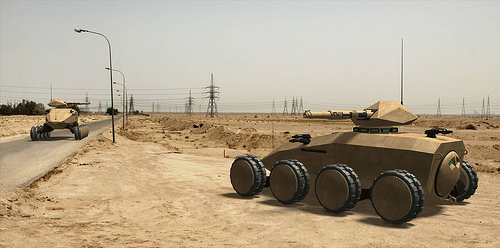Here’s a photo from a MoD-BAE Systems study into future armoured vehicles for the British Army*.
OK, so we’ve got some heavy-to-medium, wheeled armoured vehicles, that are clearly battery-electric drive. They’re recharging from either wind power (on the right) or from some kind of deployable, containerised nuclear reactor (on the left – note the radhaz logo), in a roughly European environment, while two aircraft that might have escaped from this BAE Kingston study scream overhead.
Here’s another.
We appear to be in southern Iraq. Why? We’ve electrified land mobility. Oil is no longer so important.
Back in 1911, Winston Churchill and Jacky Fisher started to move the Navy from coal to oil, invented British Petroleum, and caused both Iran and Iraq. The historical icons are the Queen Elizabeth-class battleships, but by then the flotilla of destroyers, light cruisers, and submarines dedicated to fighting for the torpedo battlespace (Erik Lund’s awesome blog explains!) ahead and to one flank of the fleet was huge and was growing fast. The dissuasion du faible au fort provided by torpedos required speed and submersibility, which required getting rid of coal.
So, you can blame chippy northern techies from the Mechanics’ Institute for the Middle East (and also The Sound of Music), as well as their patrons for the first world war.
Surely, electrifying the army on land would be a technical change of a similar scale, which could be expected to bring about unexpected strategic and political consequences? Would we care as much about the GCC? Although the UK withdrawal from east-of-Suez was finally completed in 1977, the Navy was back in the Gulf in 1980 on the Armilla patrol, and, well, you know the rest. What if it suddenly didn’t matter so much? The presence of 160,000 UK nationals, a town bigger than Oxford or the size of Wigan, has a lot to do with this, but then, it’s the oil that draws them there.
(*Yeah – having spent £192 million on “concept work” without procuring a single vehicle while there were two wars on, and then bought a 40 tonne monster never used in battle as an agile reconnaissance platform, that’s meant to be air portable in the spec but only fits into 5 of the RAF’s transport aircraft, they’ve started another future design study. It’s only money.)


Surely, electrifying the army on land would be a technical change of a similar scale, which could be expected to bring about unexpected strategic and political consequences? Would we care as much about the GCC?
Yes, of course we would, because every civilian vehicle on the road, and a lot of the trains, would still require oil.
I would expect that if we were moving the forces’ vehicle fleet to electrical power, the same thing might happen elsewhere soon enough?